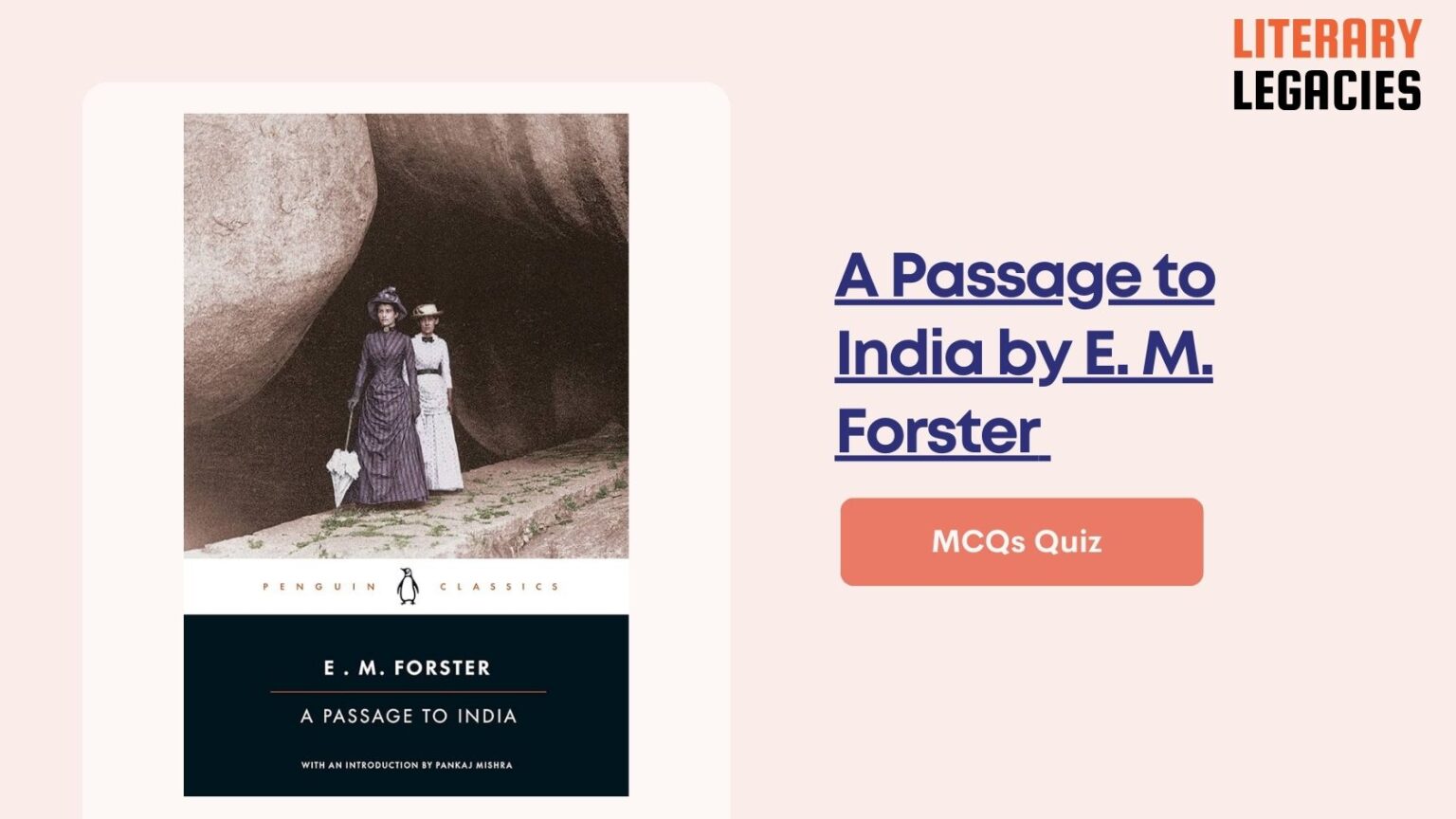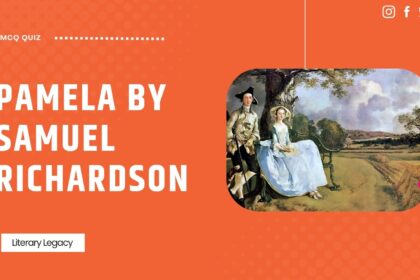1. What was the occasion where Aziz and Fielding first became friendly?
A. A dinner at the Government College
B. A trip to the Marabar Caves
C. A party at Ronny’s house
D. A tea at Fielding’s
Answer: A tea at Fielding’s (D)
This event marked the beginning of their friendship.
2. Why did Adela change her mind about marrying Ronny?
A. Aziz persuaded her to marry him instead
B. Fielding advised her to do so
C. The excitement of the car accident made her reconsider
D. She realized she didn’t love him
Answer: The excitement of the car accident made her reconsider (C)
A sudden event changed her mind about the marriage.
3. What did Mrs. Moore experience in the cave that unnerved her?
A. The echo that seemed to translate every sound into ‘boum’
B. The loud noise of the guide’s voice
C. The feeling of being claustrophobic
D. The darkness of the cave
Answer: The echo that seemed to translate every sound into ‘boum’ (A)
This experience stayed with her even after the event.
4. Why did Aziz storm off into a cave?
A. He saw a snake in the cave
B. The guide was being uncooperative
C. He was tired of the expedition
D. Adela asked him if he had more than one wife
Answer: Adela asked him if he had more than one wife (D)
Aziz was offended by Adela’s question.
5. What was Aziz charged with after Adela accused him?
A. Disrespecting the British authorities
B. Attempted robbery
C. Assaulting the guide
D. Attempting to rape Adela
Answer: Attempting to rape Adela (D)
A false accusation led to Aziz’s arrest.
6. Why did Fielding join the Indians in Aziz’s defense?
A. He was a close friend of Aziz’s
B. He wanted to gain popularity among the Indians
C. He believed Aziz to be innocent
D. He was afraid of the British authorities
Answer: He believed Aziz to be innocent (C)
Fielding stood up for what he believed in.
7. What did Mrs. Moore realize about India before she died?
A. That the British ruled India
B. That the Indians were very friendly
C. That there was no ‘real India’ – but a complex multitude of different Indias
D. That it was a very hot country
Answer: That there was no ‘real India’ – but a complex multitude of different Indias (C)
A profound realization about the nature of India.
8. What happened to Adela after Aziz was set free?
A. She spent the next several weeks at the Government College
B. She stayed with Fielding and his wife
C. She returned to England immediately
D. She went back to Ronny’s house
Answer: She spent the next several weeks at the Government College (A)
Fielding escorted her to the Government College.
9. Where did Aziz become the chief doctor to after Aziz’s trial?
A. A small village near Marabar
B. The Government College
C. The hospital in Chandrapore
D. The palace of the Rajah of Mau
Answer: The palace of the Rajah of Mau (D)
Aziz moved to a new place after the trial.
10. Who did Fielding actually marry, not Adela Quested?
A. Ralph Moore
B. Stella Moore
C. A woman from the village near Marabar
D. Mrs. Moore
Answer: Stella Moore (B)
A surprising twist in the story.
11. What is Adela’s expectation about her trip to India?
A. To study Indian literature
B. To get engaged to Mrs. Moore’s son, Ronny
C. To explore the cultural institutions of India
D. To meet prominent British officials in India
Answer: To get engaged to Mrs. Moore’s son, Ronny (B)
Adela is hoping to finalize her engagement with Ronny during her visit.
12. Who is frustrated with the treatment he receives from the English?
A. Mr. Turton, the collector of Chandrapore
B. Ronny, the British magistrate
C. Aziz, the young Muslim doctor
D. Cyril Fielding, the principal of the government college
Answer: Aziz, the young Muslim doctor (C)
Aziz is frustrated with the poor treatment he receives from the English, especially Major Callendar.
13. What is the topic of conversation among Aziz and his friends?
A. Whether an Indian can be friends with an Englishman in India
B. The cultural differences between India and England
C. The importance of education in India
D. Indian politics and government
Answer: Whether an Indian can be friends with an Englishman in India (A)
Aziz and his friends discuss whether it is possible for an Indian to be friends with an Englishman in India.
14. Who hosts a party to introduce Adela and Mrs. Moore to prominent Indians?
A. Ronny, the British magistrate
B. Mr. Turton, the collector of Chandrapore
C. Cyril Fielding, the principal of the government college
D. Major Callendar, the civil surgeon
Answer: Mr. Turton, the collector of Chandrapore (B)
Mr. Turton hosts the party to introduce Adela and Mrs. Moore to the prominent and wealthy Indians in Chandrapore.
15. What is the occasion for Adela and Mrs. Moore’s meeting with Cyril Fielding and Professor Godbole?
A. A formal dinner at the government college
B. A picnic in the outskirts of Chandrapore
C. Tea at Cyril Fielding’s home
D. A visit to a local museum
Answer: Tea at Cyril Fielding’s home (C)
Cyril Fielding invites Adela and Mrs. Moore to tea at his home, along with Professor Godbole.
16. What is Adela’s attitude towards the Indians during her visit?
A. She is suspicious and aloof
B. She is condescending and superior
C. She is indifferent and neutral
D. She is friendly and open
Answer: She is friendly and open (D)
Adela is described as being friendly and open towards the Indians she meets.
17. What is Mrs. Moore’s hope for her visit to India?
A. To learn Indian cooking techniques
B. To meet the ruler of India
C. To see the cultural institutions imported by the British
D. To see the real India, beyond British influence
Answer: To see the real India, beyond British influence (D)
Mrs. Moore, like Adela, hopes to see the real India during her visit, rather than just cultural institutions imported by the British.
18. Who is Aziz’s friend that he discusses friendship with Englishmen with?
A. Major Callendar, the civil surgeon
B. Cyril Fielding and Professor Godbole
C. Ronny, the British magistrate
D. Hamidullah and Mahmoud Ali
Answer: Hamidullah and Mahmoud Ali (D)
Aziz discusses the possibility of friendship with Englishmen with his friends Hamidullah and Mahmoud Ali.
19. Where do Mrs. Moore and Aziz first meet?
A. At Cyril Fielding’s home
B. At the government college
C. At a local mosque
D. At the party hosted by Mr. Turton
Answer: At a local mosque (C)
Mrs. Moore and Aziz first meet while exploring a local mosque in Chandrapore.
20. What is the occupation of Cyril Fielding?
A. Collector of Chandrapore
B. Principal of the government college
C. Civil surgeon
D. British magistrate
Answer: Principal of the government college (B)
Cyril Fielding is the principal of the government college in Chandrapore.
21. What is the primary question that A Passage to India poses and explores?
A. The impact of liberal humanism on British-Indian relationships
B. The role of women in Indian society during the British colonial era
C. Whether the British colonial rule in India was justified
D. Whether an Englishman and an Indian can ever be friends within the context of British colonialism
Answer: Whether an Englishman and an Indian can ever be friends within the context of British colonialism (D)
The novel explores the possibility of friendship between English and Indians, using the relationship between Aziz and Fielding as a model.
22. How does Aziz initially view the English at the beginning of the novel?
A. With suspicion and hostility
B. With admiration and respect
C. With curiosity and open-mindedness
D. With scorn, wishing to consider them comically or ignore them completely
Answer: With scorn, wishing to consider them comically or ignore them completely (D)
Aziz’s initial viewpoint towards the English changes after his encounter with Mrs. Moore in the mosque.
23. What is the outcome of Aziz and Fielding’s friendship after Adela’s accusation and trial?
A. Their friendship transforms into a romantic relationship
B. Their friendship remains unaffected by the events
C. Their friendship becomes stronger and more resilient
D. Their friendship falls apart due to external strains
Answer: Their friendship falls apart due to external strains (D)
The external strains on their relationship, arising from their cultural backgrounds, ultimately lead to the breakdown of their friendship.
24. What is the key characteristic of Aziz’s personality that leads to tension in his relationship with Fielding?
A. His lack of good will and frankness in his interactions
B. His inability to connect with others on an intellectual level
C. His tendency to let his imagination run away with him and to let suspicion harden into a grudge
D. His inability to adapt to different cultural norms
Answer: His tendency to let his imagination run away with him and to let suspicion harden into a grudge (C)
Aziz’s imagination and tendency to hold grudges create tension in his relationship with Fielding.
25. What is the underlying message that Forster conveys through the relationship between Fielding and Aziz in the first half of the novel?
A. That Indians are inherently inferior to the British
B. That British rule in India could be successful and respectful if only English and Indians treated each other as worthy individuals
C. That British colonial rule in India is necessary and beneficial
D. That British and Indians are fundamentally incompatible
Answer: That British rule in India could be successful and respectful if only English and Indians treated each other as worthy individuals (B)
Forster suggests that British rule in India could be successful and respectful if only English and Indians treated each other with mutual respect and understanding.
26. What is the main effect of the ‘muddle of India’ on Adela’s feelings about Ronny?
A. It makes her feelings more rational and clear.
B. It externalizes and muddles her feelings, making them seem like something outside of her.
C. It eliminates her feelings for Ronny altogether.
D. It makes her feelings more intense and passionate.
Answer: It externalizes and muddles her feelings, making them seem like something outside of her. (B)
The ‘muddle of India’ is a central theme in the novel, affecting the characters’ perceptions and experiences.
27. How does Forster portray the Englishwomen in the novel?
A. As timid and shy around the Indians.
B. As overwhelmingly racist, self-righteous, and condescending to the native population.
C. As fiercely independent and open-minded.
D. As kind and understanding towards the Indians.
Answer: As overwhelmingly racist, self-righteous, and condescending to the native population. (B)
Forster’s satire of the Englishwomen in the novel is notable for its harshness.
28. What is the underlying message in Forster’s critique of the British colonial government in India?
A. That the British are inherently superior to the Indians.
B. That the British should become kinder and more sympathetic to the Indians with whom they live.
C. That the British should abandon India outright.
D. That the British should adopt a more authoritarian approach to governing India.
Answer: That the British should become kinder and more sympathetic to the Indians with whom they live. (B)
Forster’s critique of the British colonial government is nuanced and multifaceted.
29. What is the significance of Edward Said’s ‘orientalizing’ concept in relation to Forster’s novel?
A. It argues that the East is superior to the West in all aspects.
B. It suggests that Western logic and capability are self-evident and superior to Eastern ways.
C. It proposes that the East and West are equal and interchangeable.
D. It implies that the East is inherently inferior to the West.
Answer: It suggests that Western logic and capability are self-evident and superior to Eastern ways. (B)
Edward Said’s concept of ‘orientalizing’ is relevant to understanding the Western perspective on the East in Forster’s novel.
30. What is the tone of Forster’s portrayal of the British colonial officials in the novel?
A. Overwhelmingly positive and celebratory.
B. Ambivalent and detached, without taking a clear stance.
C. Satirical and nuanced, with a focus on their attitudes towards the Indians.
D. Harshly critical and condemnatory.
Answer: Satirical and nuanced, with a focus on their attitudes towards the Indians. (C)
Forster’s satire of the British colonial officials is a key aspect of the novel.
31. What is the outcome of Fielding’s attempts to reach out to Aziz through conversations or letters?
A. They result in a strong friendship between the two
B. They are met with indifference from Aziz
C. They are hindered by Fielding’s English literalism and rationalism
D. They lead to a deeper understanding between them
Answer: They are hindered by Fielding’s English literalism and rationalism (C)
Fielding’s inability to connect with Aziz is a significant aspect of the novel.
32. What is the main idea of Hinduism that Forster explores in the novel?
A. The unity of all living things in love
B. The need for cultural segregation
C. The importance of individual blame and intrigue
D. The concept of a hierarchical society
Answer: The unity of all living things in love (A)
Forster’s exploration of Hinduism highlights its emphasis on unity and interconnectedness.
33. What is the implication of Mrs. Moore’s experience with the echo in Marabar?
A. It terrifies her, implying that oneness can be a horror
B. It reinforces her sense of connection with all living creatures
C. It highlights the limitations of Christianity
D. It has no significant impact on her worldview
Answer: It terrifies her, implying that oneness can be a horror (A)
Mrs. Moore’s experience with the echo is a pivotal moment in the novel, highlighting the complexities of Hinduism.
34. What is the distinction between ‘muddle’ and ‘mystery’ in A Passage to India?
A. Muddle refers to disorder, while mystery refers to spiritual order
B. Muddle refers to the individual, while mystery refers to the collective
C. Muddle refers to the English experience, while mystery refers to the Indian experience
D. Muddle refers to the natural world, while mystery refers to the human experience
Answer: Muddle refers to disorder, while mystery refers to spiritual order (A)
Forster’s use of ‘muddle’ and ‘mystery’ highlights the different ways of perceiving India and its complexities.
35. What is the implication of the landscape of India in the novel?
A. It symbolizes the unity and order of the universe
B. It has no symbolic significance in the novel
C. It reflects the formlessness and disorder of the Indian environment
D. It represents the harmony between different cultures
Answer: It reflects the formlessness and disorder of the Indian environment (C)
The landscape of India serves as a backdrop to the novel’s exploration of cultural and personal complexities.



